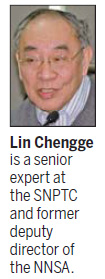Energy
New nuclear power plants 'set to be approved'
Updated: 2011-04-22 09:47
By Liu Yiyu (China Daily)
|
|
BEIJING - New nuclear power projects may be approved, following suspension of the procedure on March 16 by the State Council after the Japanese tsunami, when the nuclear safety plan is issued, probably in August, a senior nuclear expert said.
"Operating plants and plants under construction will soon be inspected and reviewed by a group of experts," Lin Chengge, a senior expert at the State Nuclear Power Technology Corp Ltd (SNPTC) and former deputy director of the National Nuclear Safety Administration (NNSA), told China Daily.
The review group completed an inspection of the Daya Bay nuclear power plant in Guangdong province, last week.
"Results of the inspection will be provided to the government so it can decide if safety improvements are needed," Lin said.
The move came after the government said on March 16 that it would suspend approval for new nuclear projects, following Japan's nuclear crisis, until a safety plan is issued.
"I think China will use the most advanced third-generation technology in all future nuclear plants," Lin said.
Four reactors under construction will use the third-generation AP 1000 model designed by US company Westinghouse Electric and introduced by the SNPTC in 2006.
"One of the units will have 70 percent of its components made in China," Lin said.
"Only the most advanced technology can restore people's confidence in nuclear safety."
However, other experts are divided on the technology to be adopted by China's future nuclear plants.
"The second-generation nuclear technology that China has been using has no safety problems," said Pan Ziqiang, director of the Science and Technology Commission at the China National Nuclear Corp (CNNC), the largest nuclear plant operator in China, which uses second-generation technology.
CNNC is building two of the four reactors that will use third-generation technology.
"Though third-generation technology is better, there is a process that takes some time from starting operations to perfecting the technology," he added.
Even though the speed and scale of China's nuclear development will be adjusted, subject to inspection results, dramatic changes are unlikely after the Japan accident, Lin said.
China could add 12 gigawatts (gW) of nuclear capacity annually in the near term and is expected to boast 70 to 80 gW by 2020, Zhou Dadi, director of China's Energy Research Institute, said on April 15.
The country had a total of 10.82 gW of nuclear capacity at the end of last year, the China Electricity Council said.
China's revised nuclear capacity was expected to reach 86 gW before Japan's nuclear crisis.
The country's resolution to develop nuclear power is unlikely to be shaken by the situation in Japan.
The country will not waver in its determination to develop nuclear power, Vice-Premier Zhang Dejiang said during a recent visit to the China Institute of Atomic Energy, affiliated to the CNNC, on April 14, according to CNNC's website.
China's nuclear development will slow down during the next two to three years but in the medium and long term its nuclear strategy cannot be shaken, the Financial Times reported, quoting Feng Yi, deputy secretary-general of the China Nuclear Energy Association.
Specials

British Royal Wedding
Full coverage of the royal wedding of Prince William and Kate Middleton in London. Best wishes

The final frontier
Xinjiang is a mysterious land of extremes that never falls to fascinate.

Bridging the gap
Tsinghua University attracts a cohort of foreign students wanting to come to China.




